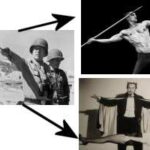Lately, I have been fascinated by a metaphor comparing hunters and farmers to founders and managers when starting and operating a business. In a previous post, I discussed the role that dyslexia and ADHD play in creating and scaling a new venture.
For most of human history, we lived in a hunter-gatherer society. Men hunted wild game while women gathered plants for food. When food became scarce in an area, the tribe simply moved on. Many hunter-gatherer traits were honed through natural selection, and their genes were passed from one generation to the next. Evolution favored the traits and qualities of the hunter. Then, about 12,000 years ago, it abruptly changed. People discovered farming and began to plant crops and domesticate animals. This change from hunter to farmer represented a fundamental shift in how societies were organized, as farmers were favored, and hunters marginalized.
Today, some people still maintain many of the genetic traits of the hunter but live in a world designed and built for farmers.
Hunters
Entrepreneurs are the equivalent of 21st-century hunters.
Hunters thrive in chaos and remain calm and act as cheerleaders even when everyone else is panicking. However, modern-day hunters are unappreciated in today’s society. People fail to grasp the extent of their risk-taking and stick-to-itiveness.
The hunters of old had to bring home meat and hides or the tribe would starve and freeze to death. It didn’t matter if it was snowing, raining, too cold, or too hot outside, people needed to eat, so the hunters needed to produce no matter the conditions. Just like hunters, entrepreneurs have to do whatever it takes to keep the business from going under.
Even though only less than 2% of America’s population owns or operates a small employee-based business (6.1m businesses / 332m population), they are responsible for 64% of all the new job creation in the United States. Small business owners care deeply about their employees and families, who are members of their tribe, just like hunters of old.
Hunting is linear in that even though you score food today, you still need to figure it out all over again tomorrow in a different location with a different set of conditions. There are no seasons for the hunter, just another day.
Farmers
Farmers, in contrast, are modern-day managers that rely on planning, budgeting, standardization, and measuring key performance indicators.
Farming is much more cyclical. Each year, you need to till the soil, plant your crop, keep it watered, and eventually, you can reap the rewards of your efforts and harvest what you have grown. Each season, you repeat the process over and over again.
In corporations, the business has budget cycles and goals. Managers are expected to work within those limitations and plan in yearly increments, just like a farmer.
Hunters in a Farmers’ World
In 1992, Thom Hartmann published the book ADHD: A Hunter in a Farmer’s world. In his book, he proposed what he called the hunter vs. farmer hypothesis. John F. Dini read Thom’s book and said it made him realize that many entrepreneurs are actually hunters living in a farming society. He looked at the ADHD symptoms in Thom’s book and recognized that many business owners behave in precisely the same way. With his new-found epiphany, John realized that management books tell entrepreneurs, who are first and foremost hunters, how to become farmers. John took the insights and wrote Hunting in a Farmer’s World: Celebrating the Mind of an Entrepreneur to recognize the role hunters play in our modern-day world.
Microenterprises and startups are founded and operated by hunters because hunters like to lead and do not like to be managed. Hunters have a problem with authority, so they make poor employees. Big businesses, on the other hand, are operated not by hunters but by farmers.
John said it makes no sense for a small business owner who is a hunter to try to duplicate the strategies and efforts of corporations that are run by farmers. Books about business management try to teach hunters how to run their businesses using ancient farming wisdom that has been translated into modern-day management tasks including planning, budgeting, standardization, and measuring.
Hunters create. Farmers manage. Hunters explore. Farmers analyze. Hunters build companies with vision, creativity, and tenacity. Farmers manage existing companies with policies and procedures. Simply put, business founders are wired differently than those who work for them.
Being a hunter, according to John, does not make you more or less intelligent than a farmer. The reason it’s crucial to understand the different perspectives is to correctly identify your skillsets so you can play to your strengths and find employees to handle areas where you are weaker.
Types of Entrepreneurs
In his book, John shares that not all business owners or entrepreneurs are true hunters. In fact, he identified four types of entrepreneurs:
Technicians
Technicians are entrepreneurs who have previously learned a skill or job so well that they can do it without a manager. They are often started by craftsmen, such as those in the building trades, or service providers, such as CPAs or design firms. Technicians often work 50 to 60 hours a week because they can’t find employees that can do the work as well as themselves. Additionally, most technicians are not very good at managing people or even managing a basic business.
Technicians only become true hunters when they hire employees and learn to provide for the company and its employees, as well as their families.
Technicians try to outwork everyone because they want to be the best at their craft. The biggest challenge for the Technician is learning to work ON the business and not IN the business. The psychological reward of being a business owner for the technician is being thought of as the “answer person.”
When I worked in corporate America, I was a technician. I prided myself on being the answer guy and enjoyed getting my hands dirty. I maintained much of my technician roots when I founded my first employee-based company. It was not until my business partner Dale pointed out that I needed to change my ways that I finally agreed to let others take more control of the work, even though I knew I could do a better job than my employees.
When it came to business, I was always a technician at heart but benefited from learning some farming techniques while working in corporate America for 11 years, prior to founding my first company, and two more years before starting my second.
Inheritors
Inheritors are former employees who found themselves thrust into owning a business due to family ties or evolution. Inheritors are often second-generation owners who have been farmers for way too long or never had any hunting instincts. That is why 75% never make it through the second generation, and 90% don’t make the third generation.
The business was likely built by a hunter with a big personality who said, “Do it my way and don’t screw it up,” and by the time the inheritor finally takes over, they have no experience in actually running the business and making hard decisions, such as what to do when they lose a key customer or employee.
The best inheritors learn to be hunters and grow the business. However, most inheritors remain farmers and act as Guardians to maintain the status quo for as long as possible.
Acquirers
Acquirers buy an existing business and believe they can operate it better than the previous owners, who are most likely hunters. Most acquirers are farmers and not hunters. Acquirers don’t want to start a business from scratch.
Farmer acquirers who want to manage a proven opportunity with no changes often buy franchises. Hunter franchisees are often frustrated and quickly move on or end up owning the entire franchise system.
When it comes to franchises, being an expert is frequently considered grounds for non-acceptance. Many franchisors will not allow a hunter or someone with experience in an industry to become a franchisee because the franchisor wants farmers. They do not want creative leaders. Instead, franchisors want managers to follow the process they have defined.
My first business was an Invisible Fencing franchise. I realize now that I was a hunter franchisee and got frustrated by the rigidity, and only lasted a few years. I sold my second employee-based business to an acquirer who came from a corporate background and was primarily a farmer.
Creators
Creators are the ultimate hunters and are few and far between. They build businesses as their lifestyle, not as a job. They love the continuous hunt for investment capital, resources, talent, and new markets. Creators are what we think about when we think of the Silicon Valley startup. Most creators start out on day one intending to hire a President to handle the farming tasks so they can hunt. Only a rare few creators learn to become great farmers as the company grows in employees and product offerings. The majority usually exit within five years to start the process over again, giving rise to the term “Serial Entrepreneur.”
Creators and Acquirers tend to be more hands-off, while Technicians and Inheritors tend to be hands-on.
After I abandoned my franchise business, I started my first employee-based business. Although I started out as a technician, reluctant to delegate much of the work, I eventually discovered that I could apply enough farming techniques from my former corporate experience to grow the business to a point where it was large enough in terms of revenue and headcount to pique the interest of the public company that acquired us.
However, at that point in my career, I had reached the extent of my competence as a President farmer. Thinking back, I could have retained my role as CEO, which I was good at and loved, and hired a President to run the day-to-day business, but it had been five years since I started the business, and as a hunter, I was itching for a new challenge and decided to sell.
Hunter Traits
What separates hunter entrepreneurs from farmer entrepreneurs are three critical traits, according to John:
Problem-solving. Hunter entrepreneurs do not know the meaning of “it does not work”. It just did not work this time, so they try plans B and C and so on.
Tenacity. Hunter entrepreneurs do not understand the meaning of failure. When they encounter a roadblock, they keep at it, trying to find another way forward. There is no end to the number of plans they are willing to try to achieve the goal. Thomas Edison is a classic example and is credited with saying that he “Discovered 1,000 ways not to make a light bulb.”
The ability to steer in the fog. Hunter entrepreneurs have a clear vision and the ability to steer the ship on gut feeling even when they are not sure of the direction of the destination. They will head off in a direction they feel will get them to their vision and make adjustments as needed. While they may not always be right, they are right more often than not. They know what the company needs even if they can’t define it with data.
Conclusion
Hunter entrepreneurs cringe at the thought of getting bogged down in management tasks, reviewing budgets, creating financial statements, and doing performance reviews. Hunters get bored with something they need to do more than a few times. They like to explore and not analyze. Rather than spend time doing farming tasks, hunters should hire managerial people who like farming and are good at it.
A survey found that CEOs typically spend about 20% of their time focusing on what they do well and the rest of their time doing whatever else needs to be done. Imagine if they could spend all of their time being a hunter. How would that benefit their company?
You deserve to run a business in a way that makes sense to you. If you are a hunter, it is time to stop reading management books that teach you to be a farmer. Hire a farmer to be your President so you can focus your time and energy where you can do the most good. It’s time to be proud of being a hunter in a farmer’s world.
What type of entrepreneur are you?












